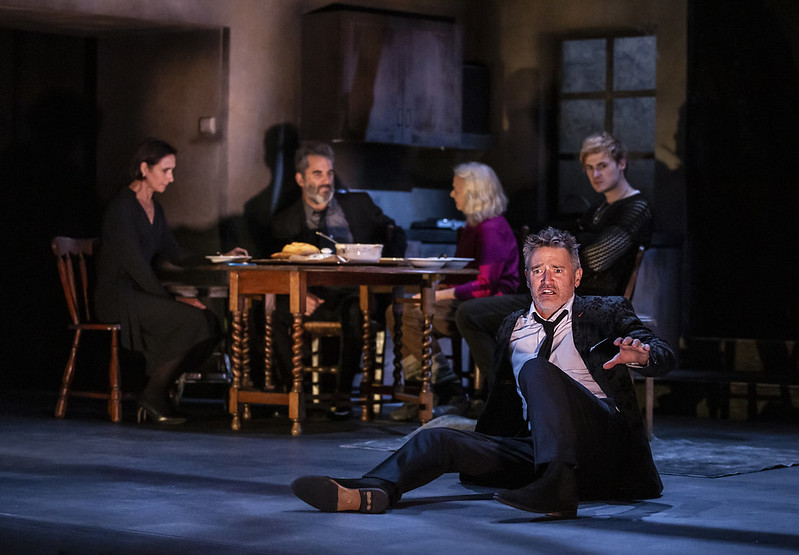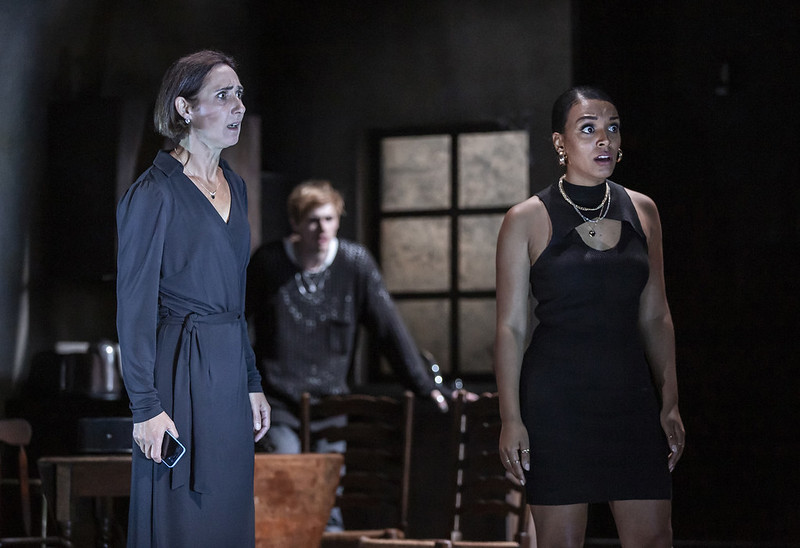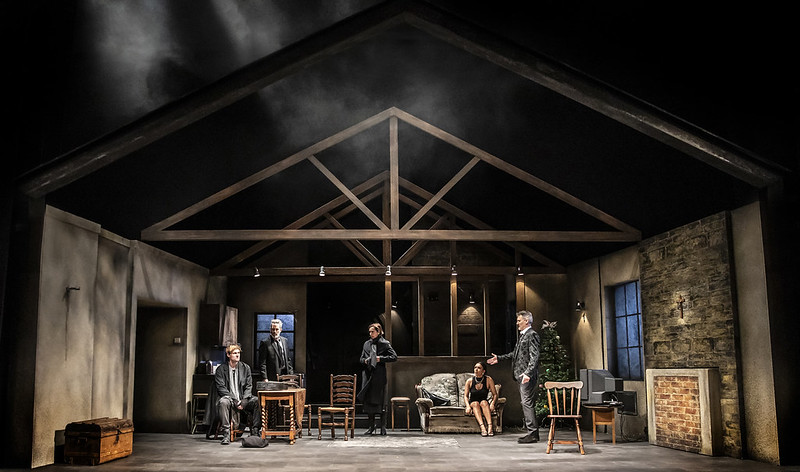Murder mystery-adjacent Murder In The Dark, making its world premiere at The Lowry, has a gripping premise and fantastic production.
Unfortunately it’s brought down by a messy ending and baffling horror aspects, but is still well worth seeing for its excellent cast and tinderbox-fraught relationships.
A collaboration between Original Theatre, Trafalgar Theatre Productions and JAS Theatricals, Torben Bett’s play sees the estranged and dysfunctional family of Danny Sierra sheltering in an isolated farmhouse after a car crash leaves them stranded on New Year’s Eve.
With just the weird and mysterious owner, Mrs Bateman, for company, the cast are tormented by the dark, strange noises and figures outside, and the paranoid world inside main character Danny’s mind.
Directed by Philip Franks, this psychological-turned-horror thriller features an all-star cast, whose performances distract – although not quite enough – from the holes in the plot and increasingly convoluted story.
Washed up-singer Danny Sierra (played by Tom Chambers) is responsible for the car crash, still over the limit from the previous night and desperately searching for his next drink. Chambers plays him excellently as the centre of his own universe, affable and apologetic for his many flaws, while also defensive and highly-strung.
In many ways Danny is infuriating – deeply self-absorbed and constantly putting his foot in it with his family, who have all suffered over the years from his self-obsessed behaviour.
But Chambers’ humane portrayal shows why his loved ones, from ex-wife Rebecca to glamorous girlfriend Sarah, can’t quite detach themselves from him.

Owen Oakeshott (formerly in Witness for the Prosecution) delivers another excellent turn as Danny’s estranged brother William, stuck in a dead-end job and seething at his brother’s success.
The relationship between the brothers is a particular highlight, at once loving and full of hurt and repressed anger.
Susie Blake is intriguing as Mrs Bateman, who lives alone in the farmhouse and may or may not have murdered her husband. Blake’s mischievous delivery provides comic relief but also home truths, interrogating an uncomfortable Danny on his drinking problem, and there’s always more to her than meets the eye.
Her sharp wit and blissful ignorance of the other characters’ awkwardness provide lots of laughs.
This is a play marked by the occasional violence of its male characters, with the women besides Mrs Bateman performing traditional roles, although doing well within a fairly limited script.
Rebecca Charles plays no-nonsense ex-wife Rebecca as the sensible, self-effacing woman in charge, but with emotional depth beneath her stoic exterior that is slowly revealed over the course of the play.
Danny’s much younger girlfriend Sarah is played with a special quality by Laura White, making her more interesting than her archetype suggests: equal parts sassy and confident, and petulant and naive.
Jonny Green is fantastic as Danny’s estranged son Jake. A young musician following in his father’s footsteps, Jake is rightly full of fury at his abandonment by his father. His monologue in the second half is a real coming of age for the character – and a chilling reflection of the anger latent among the men.
The play is at its best as a family drama, exploring the psyche of each member of this dysfunctional family trapped in an unfamiliar and deeply unsettling situation.

Paul Pyant’s lighting is appropriately sinister and is integral to the tension that sustains the play. As the title suggests the characters are frequently in darkness, and the transitions between light and power cut in the rural farmhouse are expertly done.
Sound designer and composer Max Pappenheim’s soundtrack is also brilliantly composed. Comedic touches like Danny’s old Dance Party 5 CD lighten the mood, while a creepy soundtrack underscores much of the action and is perfectly timed alongside the lighting changes. This is also a play which knows how to do silence well, particularly with the ballerina subplot.
For the whole first act the action is taut and speech clipped and clinical. Old resentments are unearthed and the action lurches from comedy to drama effectively, ratcheting up the tension as the outside world begins to break in through the walls. The tinderbox quality of the family’s interactions provides the narrative’s best moments.
Sadly it begins to lose its grip in the second act, especially with the breakneck speed of the final 20 minutes. The outright horror elements are less effective and the convoluted nature of the plot resolution, tying all the subplots together, was somewhat farcical. Parts of the audience giggled at the play’s biggest reveal – not ideal for a horror play.
Ultimately this is a play with excellent characters and relationships at its core, but which falls apart by trying to do too much at once. The production closes at The Lowry Saturday 27th January, tickets available here.
Image credits: Pamela Raith. Used with permission of The Lowry.




